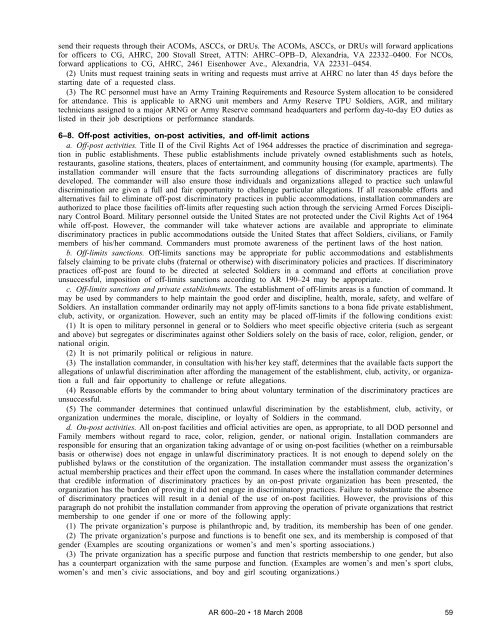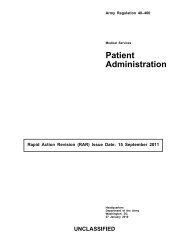AR 600-20, Army Command Policy - Army Publishing Directorate ...
AR 600-20, Army Command Policy - Army Publishing Directorate ...
AR 600-20, Army Command Policy - Army Publishing Directorate ...
Create successful ePaper yourself
Turn your PDF publications into a flip-book with our unique Google optimized e-Paper software.
send their requests through their ACOMs, ASCCs, or DRUs. The ACOMs, ASCCs, or DRUs will forward applications<br />
for officers to CG, AHRC, <strong>20</strong>0 Stovall Street, ATTN: AHRC–OPB–D, Alexandria, VA 22332–0400. For NCOs,<br />
forward applications to CG, AHRC, 2461 Eisenhower Ave., Alexandria, VA 22331–0454.<br />
(2) Units must request training seats in writing and requests must arrive at AHRC no later than 45 days before the<br />
starting date of a requested class.<br />
(3) The RC personnel must have an <strong>Army</strong> Training Requirements and Resource System allocation to be considered<br />
for attendance. This is applicable to <strong>AR</strong>NG unit members and <strong>Army</strong> Reserve TPU Soldiers, AGR, and military<br />
technicians assigned to a major <strong>AR</strong>NG or <strong>Army</strong> Reserve command headquarters and perform day-to-day EO duties as<br />
listed in their job descriptions or performance standards.<br />
6–8. Off-post activities, on-post activities, and off-limit actions<br />
a. Off-post activities. Title II of the Civil Rights Act of 1964 addresses the practice of discrimination and segregation<br />
in public establishments. These public establishments include privately owned establishments such as hotels,<br />
restaurants, gasoline stations, theaters, places of entertainment, and community housing (for example, apartments). The<br />
i n s t a l l a t i o n c o m m a n d e r w i l l e n s u r e t h a t t h e f a c t s s u r r o u n d i n g a l l e g a t i o n s o f d i s c r i m i n a t o r y p r a c t i c e s a r e f u l l y<br />
developed. The commander will also ensure those individuals and organizations alleged to practice such unlawful<br />
discrimination are given a full and fair opportunity to challenge particular allegations. If all reasonable efforts and<br />
alternatives fail to eliminate off-post discriminatory practices in public accommodations, installation commanders are<br />
authorized to place those facilities off-limits after requesting such action through the servicing Armed Forces Disciplinary<br />
Control Board. Military personnel outside the United States are not protected under the Civil Rights Act of 1964<br />
while off-post. However, the commander will take whatever actions are available and appropriate to eliminate<br />
discriminatory practices in public accommodations outside the United States that affect Soldiers, civilians, or Family<br />
members of his/her command. <strong>Command</strong>ers must promote awareness of the pertinent laws of the host nation.<br />
b. Off-limits sanctions. Off-limits sanctions may be appropriate for public accommodations and establishments<br />
falsely claiming to be private clubs (fraternal or otherwise) with discriminatory policies and practices. If discriminatory<br />
practices off-post are found to be directed at selected Soldiers in a command and efforts at conciliation prove<br />
unsuccessful, imposition of off-limits sanctions according to <strong>AR</strong> 190–24 may be appropriate.<br />
c. Off-limits sanctions and private establishments. The establishment of off-limits areas is a function of command. It<br />
may be used by commanders to help maintain the good order and discipline, health, morale, safety, and welfare of<br />
Soldiers. An installation commander ordinarily may not apply off-limits sanctions to a bona fide private establishment,<br />
club, activity, or organization. However, such an entity may be placed off-limits if the following conditions exist:<br />
(1) It is open to military personnel in general or to Soldiers who meet specific objective criteria (such as sergeant<br />
and above) but segregates or discriminates against other Soldiers solely on the basis of race, color, religion, gender, or<br />
national origin.<br />
(2) It is not primarily political or religious in nature.<br />
(3) The installation commander, in consultation with his/her key staff, determines that the available facts support the<br />
allegations of unlawful discrimination after affording the management of the establishment, club, activity, or organization<br />
a full and fair opportunity to challenge or refute allegations.<br />
(4) Reasonable efforts by the commander to bring about voluntary termination of the discriminatory practices are<br />
unsuccessful.<br />
(5) The commander determines that continued unlawful discrimination by the establishment, club, activity, or<br />
organization undermines the morale, discipline, or loyalty of Soldiers in the command.<br />
d. On-post activities. All on-post facilities and official activities are open, as appropriate, to all DOD personnel and<br />
Family members without regard to race, color, religion, gender, or national origin. Installation commanders are<br />
responsible for ensuring that an organization taking advantage of or using on-post facilities (whether on a reimbursable<br />
basis or otherwise) does not engage in unlawful discriminatory practices. It is not enough to depend solely on the<br />
published bylaws or the constitution of the organization. The installation commander must assess the organization’s<br />
actual membership practices and their effect upon the command. In cases where the installation commander determines<br />
that credible information of discriminatory practices by an on-post private organization has been presented, the<br />
organization has the burden of proving it did not engage in discriminatory practices. Failure to substantiate the absence<br />
of discriminatory practices will result in a denial of the use of on-post facilities. However, the provisions of this<br />
paragraph do not prohibit the installation commander from approving the operation of private organizations that restrict<br />
membership to one gender if one or more of the following apply:<br />
(1) The private organization’s purpose is philanthropic and, by tradition, its membership has been of one gender.<br />
(2) The private organization’s purpose and functions is to benefit one sex, and its membership is composed of that<br />
gender (Examples are scouting organizations or women’s and men’s sporting associations.)<br />
(3) The private organization has a specific purpose and function that restricts membership to one gender, but also<br />
has a counterpart organization with the same purpose and function. (Examples are women’s and men’s sport clubs,<br />
women’s and men’s civic associations, and boy and girl scouting organizations.)<br />
<strong>AR</strong> <strong>600</strong>–<strong>20</strong> 18 March <strong>20</strong>08<br />
59
















